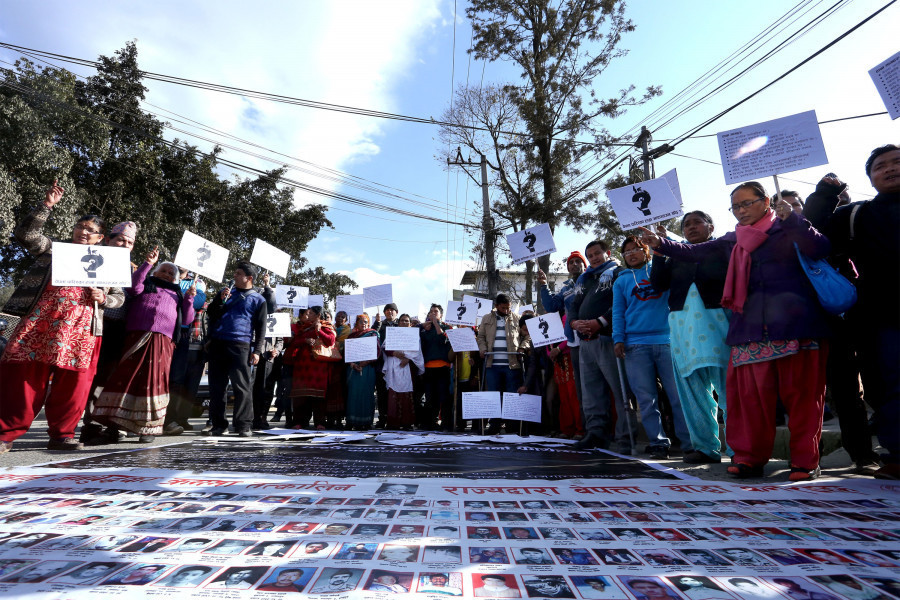National
Amid poor human rights record, Nepal presents rosy picture in its Universal Periodic Review report
Victims of the conflict, non-governmental organisations quash the government’s claims.
Binod Ghimire
As conflict victims and various non-governmental organisations criticise the government for not implementing recommendations from the last Universal Periodic Review (UPR), the government has painted a rosy picture about it in its report to be presented at the United Nations Human Rights Council in January next year.
The report, submitted to the council last week, says remarkable progress has been made towards the implementation of the recommendations made by the last UPR, but critics disagree.
The government, during the 2015 periodic review, had committed to implementing 152 recommendations, which included issues related to transitional justice, citizenship and the rights of women and sexual minorities. The council had given the government five years to translate its commitments into action.
Koshal Chandra Subedi, joint-secretary at the Prime Minister’s Office who leads the team preparing the report, said never before had Nepal’s implementation record been better. “We are in a strong position to defend ourselves this time,” he told the Post. “A majority of the recommendations have either been implemented fully or partially.”
Subedi said most of the recommendations received during the last periodic review were related to legal reform, which have been addressed by the Constitution of Nepal and laws formulated to implement its provisions. The Constituent Assembly hadn’t promulgated the constitution when Nepal last submitted its report to the council in 2015. The constitution, however, was only a month old when the review was done.
The government’s report says Nepal stands at the most conducive state for the promotion and protection of human rights.
Observers, however, say the claim in the report contradicts reality as the cases of human rights violations have been increasing. “The facts speak for themselves. The government is trying to create an illusion to the international community with the report,” Charan Prasain, a human rights activist, told the Post. “Successive governments haven’t taken any concrete steps towards improving the human rights situation from the previous review.”
He said cases of extrajudicial killings have increased, so have reports of rape and violence against women. Discriminations against the Dalit community continues while there are also the reports that people have starved to death during Covid-19 crisis.
Human rights defenders say that Nepal is likely to face questions from various countries, especially those that made recommendations during the previous review, when it faces the UPR in January. The review, scheduled for November, was postponed by two months due to the Covid-19 pandemic.
Contrary to the government’s report, reports from different non-governmental organisations and associations of victims of the decade-long Maoist insurgency, paint a bleak picture when it comes to the implementation of the UPR recommendations.
Along with the government, different non-government organisations, rights groups and the National Human Rights Commission also send separate reports for the UPR.
They have claimed that not a single recommendation among the 19 related to transitional justice has been fully implemented. A report by a consortium of 440 non-governmental organisations and 39-organisations says that Nepal has wasted five years without taking concrete steps towards implementing the recommendations.
“We value the upcoming UPR of Nepal as a significant opportunity to inform the world about the long-standing denial of our right to effective remedy guaranteed under the international law and our own Constitution of Nepal,” reads a report by the conflict victims organisations.
The government report, meanwhile, says that Nepal now has strong legal provisions against torture and it has investigated all cases of extrajudicial killing. However, various reports suggest that the government hasn’t booked police officials involved in extrajudicial killings despite recommendations from the National Human Rights Commission to do so. Similarly, the practice of torture continues even in police custody while reports of custodial deaths continue to emerge.
In its report, the government claims that it has ensured the right to housing as a fundamental right and there is a law in a place to provide homeless citizens appropriate and safe housing. The report, however, doesn’t talk about how the homeless have benefited from the legal provision. Despite the legal provisions, actions of state authorities have been making people homeless.
In July, officials at the Chitwan National Park set two houses of the indigenous Chepang community ablaze and destroyed eight others using elephants with the intention of evicting 1o families who had been living in Kusumkhola, an area that falls under the park’s territory.
Challenging the government’s claim that most of the UPR recommendations have been implemented, human rights activists say there might be new legal frameworks in place but that hasn’t translated into actions.
“We stand with the government when it comes to positive steps. However, we will continue to raise our voices to pressurise it to live up to its commitments,” Gopal Krishna Siwakoti, president of International Institute for Human Rights, Environment and Development, a rights organisation had said in a government consultation held last month.




 13.12°C Kathmandu
13.12°C Kathmandu














